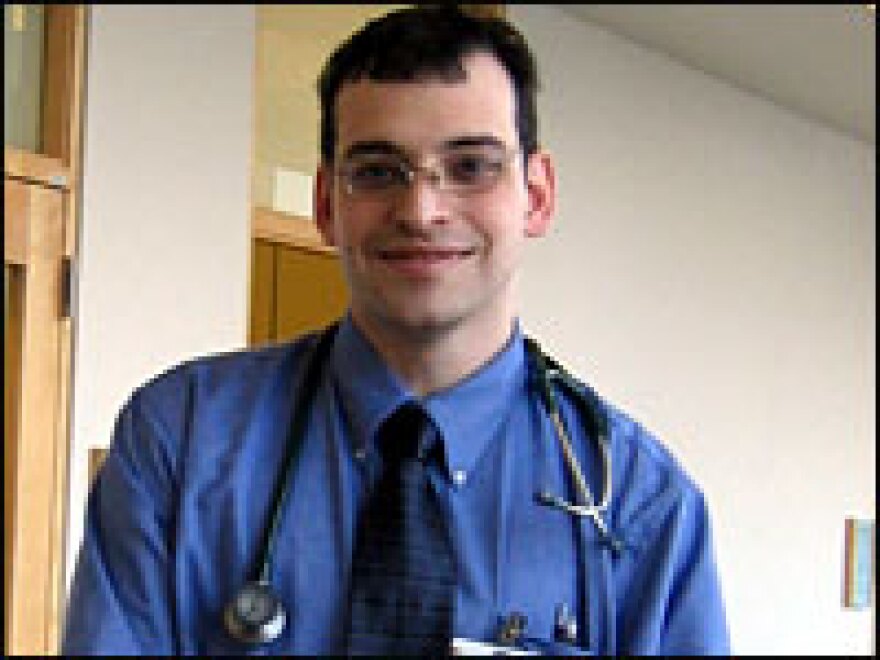Seven years ago, Heather Brewster's car was rear-ended by Sookim Hong, a medical resident who'd just finished a 36-hour hospital shift. Brewster suffered massive brain injuries and was in a coma for weeks. The accident left Brewster permanently disabled: she now walks slowly, doesn't remember much of what she used to and has been declared incompetent by the courts.
Brewster's family is suing Hong and the hospital that employed her at the time. Some medical residents say the courts may be the only way to force a change in hospitals' long-held practice of working residents for long stretches at a time.
The lawsuit comes as new studies find that when doctors-in-training work long on-call shifts, they are more likely to cause motor vehicle accidents when they leave work.
The Science Behind Safety Concerns
Currently, medical residents' hours are set by the Accreditation Council of Graduate Medical Education. Two years ago, the organization reduced residents' on-call shifts to 30 hours maximum.
Dr. Laura Barger, Dr. Charles Czeisler and their colleagues from the division of sleep medicine at Brigham and Women's Hospital in Boston recently surveyed 2,700 first-year interns. They found that when interns worked long on-call shifts, they were more than twice as likely to get into car accidents after leaving the hospital.
The study was conducted in the 2002-2003 academic year, before the ACGME reduced residents' on-call shifts. Below are some highlights from the study.
Summary of Findings from the Harvard Work Hours, Health and Safety Group:
-- Average number of consecutive hours worked by interns in 2002-2003 on extended-duration shifts: 32 consecutive hours*
-- Average number of hours worked per week in 2002-2003: 70.7 hours**
-- When interns drove home from an extended (longer than 24-hour) work shift, their odds of a motor vehicle crash were 2.3 times greater than when the same interns commuted from work after a shift that, on average, was less than 12 hours long. Interns' odds of a near-miss crash (in which bodily harm or property damage were narrowly avoided) were increased nearly six fold after an extended-duration work shift.
-- In a prospective analysis during the 2002-2003 academic year, every extended work shift that was scheduled in a month increased the monthly risk of a motor vehicle crash during the commute from work by 16.2 percent. (The new ACGME regulations allow eight 30-hour shifts to be worked per month.)
-- In months in which interns worked five or more extended shifts, their odds of falling asleep while driving were 2.39 times greater; their odds of falling asleep while stopped in traffic were 3.69 times greater than in months when they did not work extended shifts.
-- Interns were awake 96 percent of their work time in U.S. hospitals during the 2002-2003 academic year. They reported that their patient workload did not allow them to make much use of the "on-call" rooms that hospitals provide for them to sleep.
* Note: In July 2003, ACGME regulations set the shift-duration limit at 30 consecutive hours, and permitted every other shift to be extended. On this new ACGME-sanctioned schedule, a 30-hour shift can alternate with an 10-hour shift in consecutive sequence, such that a typical seven-day work week under the new ACGME guidelines would be: Monday and Tuesday: 30-hour shift; Wednesday: 10-hour shift; Thursday-Friday: 30-hour shift; Saturday: 10-hour shift; Sunday: day off.
** In July 2003, ACGME regulations set the weekly work-hour limit at 80 hours, averaged over four weeks.
Research summary provided by Dr. Charles A. Czeisler, director of the Sleep Medicine Division at Harvard Medical School.
Copyright 2022 NPR. To see more, visit https://www.npr.org.



